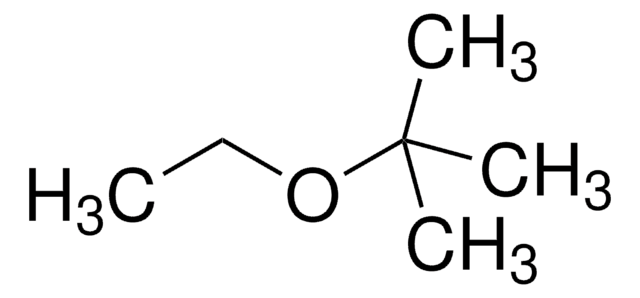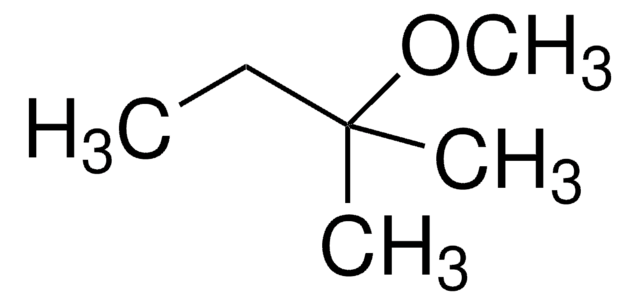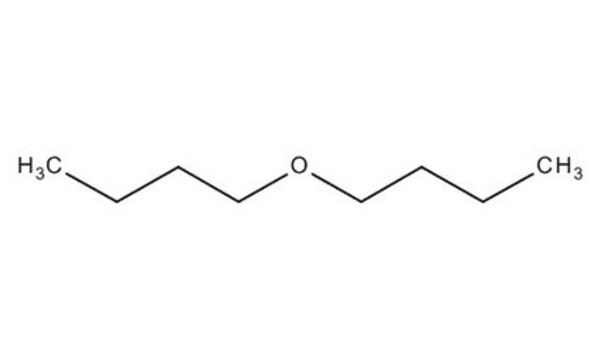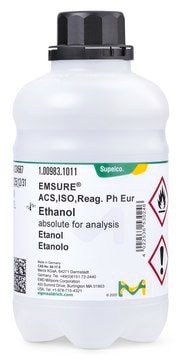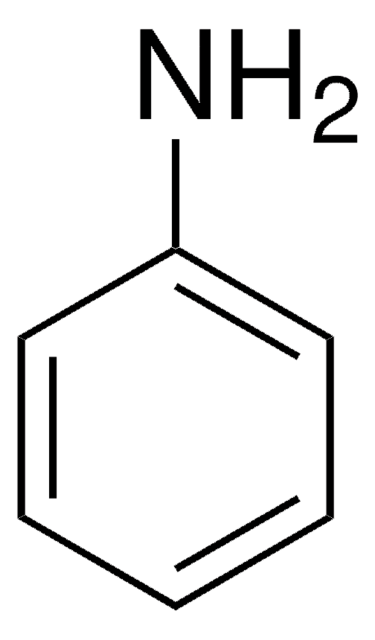8.41873
tert-Butyl ethyl ether
for synthesis
Synonim(y):
tert-Butyl ethyl ether
About This Item
Polecane produkty
ciśnienie pary
173 hPa ( 25 °C)
Poziom jakości
Próba
≥95.0% (GC)
Postać
liquid
siła działania
>2000 mg/kg LD50, oral (Rat)
>2000 mg/kg LD50, skin (Rabbit)
granice wybuchowości
1.23-7.7 % (v/v)
tw
71 °C/1013 hPa
mp
-97 °C
temp. przejścia
flash point -19 °C
rozpuszczalność
12 g/L
gęstość
0.74 g/cm3 at 20 °C
temp. przechowywania
2-30°C
InChI
1S/C6H14O/c1-5-7-6(2,3)4/h5H2,1-4H3
Klucz InChI
NUMQCACRALPSHD-UHFFFAOYSA-N
Zastosowanie
- Quantitative structure-property relationship modeling: tert-Butyl ethyl ether is used in physiologically based kinetic modeling, showcasing its role in quantitative structure-property relationship (QSPR) studies and Monte Carlo simulations, which are crucial for predicting the behavior of chemicals in biological systems (Yamada et al., 2022).
- Automatic monitoring of VOCs: It is utilized in the development of an in-source helical membrane inlet with single photon ionization time-of-flight mass spectrometry, enhancing the automatic monitoring of trace volatile organic compounds in water, significant for environmental monitoring and safety (Li et al., 2019).
- Pharmacokinetic and toxicological research: The ether serves as a subject in the development and application of rat physiologically based pharmacokinetic (PBPK) models to elucidate kidney and liver effects induced by ethyl tert-butyl ether and tert-butanol, offering valuable insights into its safety and physiological impacts (Chiu et al., 2015).
- Environmental monitoring: It is also featured in research focusing on the determination of fuel ethers in water by membrane extraction ion mobility spectrometry, providing an efficient method for environmental monitoring of this compound in aquatic systems (Sillanpää et al., 2013).
- Exposure assessment: Research includes exposure assessment studies of ethyl tert-butyl ether among gas station workers and gasoline tanker truck drivers, emphasizing the importance of occupational safety and health standards in industries using this chemical (Omae et al., 2011).
Komentarz do analizy
Density (d 20 °C/ 4 °C): 0.737 - 0.744
Identity (IR): passes test
Hasło ostrzegawcze
Danger
Zwroty wskazujące rodzaj zagrożenia
Zwroty wskazujące środki ostrożności
Klasyfikacja zagrożeń
Flam. Liq. 2 - STOT SE 3
Organy docelowe
Central nervous system
Kod klasy składowania
3 - Flammable liquids
Klasa zagrożenia wodnego (WGK)
WGK 1
Temperatura zapłonu (°F)
-2.2 °F - closed cup
Temperatura zapłonu (°C)
-19 °C - closed cup
Certyfikaty analizy (CoA)
Poszukaj Certyfikaty analizy (CoA), wpisując numer partii/serii produktów. Numery serii i partii można znaleźć na etykiecie produktu po słowach „seria” lub „partia”.
Masz już ten produkt?
Dokumenty związane z niedawno zakupionymi produktami zostały zamieszczone w Bibliotece dokumentów.
Nasz zespół naukowców ma doświadczenie we wszystkich obszarach badań, w tym w naukach przyrodniczych, materiałoznawstwie, syntezie chemicznej, chromatografii, analityce i wielu innych dziedzinach.
Skontaktuj się z zespołem ds. pomocy technicznej